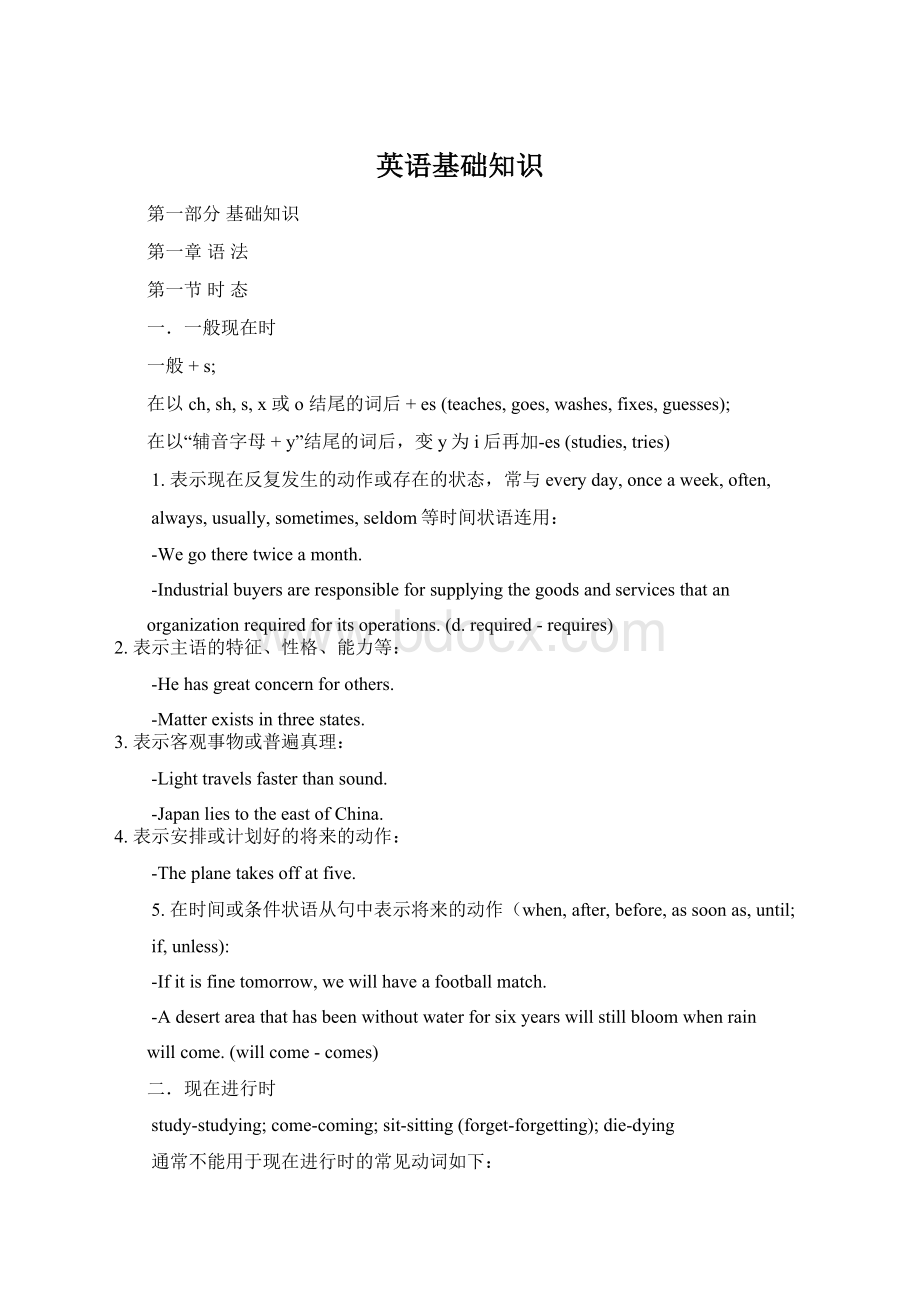英语基础知识Word文档格式.docx
《英语基础知识Word文档格式.docx》由会员分享,可在线阅读,更多相关《英语基础知识Word文档格式.docx(26页珍藏版)》请在冰豆网上搜索。

5.在时间或条件状语从句中表示将来的动作(when,after,before,assoonas,until;
if,unless):
-Ifitisfinetomorrow,wewillhaveafootballmatch.
-Adesertareathathasbeenwithoutwaterforsixyearswillstillbloomwhenrain
willcome.(willcome-comes)
二.现在进行时
study-studying;
come-coming;
sit-sitting(forget-forgetting);
die-dying
通常不能用于现在进行时的常见动词如下:
see,hear,smell,taste,know,find,forget,notice,suggest,be,love,like,want,hope,
wish,prefer,hate,understand,remember,believe,have,consist,seem.
1.表示此时此刻(说话时)正在进行的动作:
-Thestudentsarerunningtothesports-field.
2.表示现阶段正在进行的动作,但此刻不一定在进行:
-Heiswritinganovelthisyear.
3.可表示将来发生的动作,这一用法常用于go,come,leave,start等动词,后面也
常用表示较近的将来时间状语,如tomorrow,tonight,thiscomingFriday等,表
示安排或计划好的事情:
-ThosevisitorsareleavingforWuhantomorrow.
4.用来给习惯性动作加上赞赏或讨厌等感情色彩:
-Theboywhoissittingbesidemeisalwaysaskingmealotofwhysandhows.
-Hewasseeingsomebodycreepingintothehousethroughtheopenwindowlastnight.
三.现在完成时
1.表示动作现在刚完成:
-Hissonhasfinishedhishomework.
2.表示过去做的动作对现在仍有影响:
-It'
ssocoldinhere.Whohasbrokenthewindow?
3.过去某时开始的动作一直延续到现在(这时常和since或for短语连用)
-LihasstudiedEnglishfortwentyyears.
-Collectingdollsasahobbybecomesincreasinglypopularduringthepastfiftyyears.
b[注]1.副词用:
just,before,already,often,never,ever,always,not...yet或now,today,
thisweek等;
不用过去的时间状语。
2.-Hisgrandmother______forthirtyyears.
a.diedb.haddiedc.hasbeendeadd.hasdied
-Hehasbeeninthearmyfortwoyears.(不能说Hehasjoinedthearmyfor...)
-I______acollegestudentformorethanayear.
a.becameb.havebecomec.wasd.havebeen
-ItisthreeyearssincehesenttotheU.S.
(不能说HehasgonetotheU.S.forthreeyears.)
四.一般过去时
时间状语有:
yesterday,ago,in1978,once,lastweek(month,year),atthattime,
justnow等,以及由when等引导的句子。
1.表示某一确定的过去时间发生的动作或存在的状态:
-OberlinCollegeawardsdegreestobothsexesin1837,buteducaioninAmericancollegesdidnotspreaduntilthesecondhalfofthecentury.(awards-awarded)
2.表示过去某一段时间内经常发生或习惯的动作:
-From1910to1927CorraHarris______outanaverageofanovelayear.
a.hasbroughtb.werebringingc.hadbroughtd.brought
3.usedto:
-Weusedtogetupatfiveeverymorningwhenwewereinthecountryside.
五.过去进行时
表示过去某一时刻或某个阶段正在进行的动作或正发生的历史事件。
-Billsaidthathe______hishomeworkathalfpastsevenyesterdayevening.
a.didb.wasdoingc.isgoingtodod.hasdone
六.过去完成时
1.结束性动作--即“已完成”,表示在过去某一时间之前就已完成了的动作。
常有by,before,until,assoonas,when,because等引导的短语或从句,表示过去
的时间。
-Bytheendoflastyear,hehadlearnedabout1,000words.
Preposition(G)
1.in,on,atyesterdaymorninginthemorningtomorrowmorning
yesterdayafternoonintheafternoontomorrowafternoon
yesterdayeveningintheeveningtomorrowevening
thismorning
thisafternoonatdawn
thiseveningatnoon
atnight
Before'
day'
weuse'
on'
:
onSunday(Monday..)onSundaymorning
onOct.1ontheafternoonofOct.1
onMayDayonthemorningofMayDay
onNationalDayontheeveningofNationalDay
onChristmasonChristmaseve
onacoldwintermorning,onahotJuneafternoon,etc.
Intheconceptofspace:
arriveinNewYork;
arriveatthestation
inLondon,Tokyo,etc.butatthebusstop
2.overonabove超过(或低于)某高度、标准。
underbeneathbelowe.g.abovethesealevel(海拔)
直上,直下(接触表面的)上下belowOdegree
3.except1.TheyallwenttosleepexcepttheyoungFrenchman.
2.Herarelywentanywhereexcepttohisoffice.
3.Thewindowswereneveropenedexcepttoairtheroomforafewminutes
inthemorning.
besidesBesidesEnglish,hehastostudyGermanandFrench.
exceptfor1.Theroomwasbareoffurnitureexceptforafewchairs.
2.Thecompositionisgoodexceptforafewspellingmistakes.
exceptthat(when,after,etc.)
1.Thissuitfitsmewellexceptthatthetrousersaretoolong.
2.It'
sasatisfactoryhat,exceptthatitdoesn'
tfitme.
3.Mr.Smithusedtogofishingeveryweekendexceptwhenhewasill.
1.Theartexhibitionwaswelldesigned,______thedisarrangementofafewpiecesof
photos.
a.exceptb.besidesc.exceptford.inadditionto
2.Shehurriedwhensheknewthateverybodywasready______her.
a.exceptb.exceptforc.besided.besides
3.______beingusedinindustry,lasercanbeappliedtooperationsinthehospital.
a.Exceptforb.Exceptthatc.Inadditiontod.Beside
4.______coal,themostimportantnaturalfuelsaregasandoil.
a.Exceptforb.Exceptc.Besidesd.Beside
(Apartfrom)
5.Atthefarsideoftheyardtherewasakitchengarden(菜园),and______thatwas
theorchard(果园).(再过去是果园)
a.apartfromb.exceptc.exceptford.beyond
6.Thecompositionsbythefreshmenclassarewell-written______afewerrorsin
spellingandgrammar.
a.unlessb.exceptthatc.exceptford.besides
Nouns(G)
1.Uncountablenouns:
advice,anger,applause,baggage(luggage),cake,chalk,chocolate,cloth,clothing,bread,damage,equipment,evidence,food,fruit,furniture,gold,homework,housework,information,ink,jewellery,knowledge,machinery,mail(邮件),money,music,news,paper,personnel,postage(邮资,邮费),protection,rice(salt,sugar,tea),scenery,soap,sugar,toothpaste,traffic,transportation,weaponry,weather,work.
2.有些不可数名词以复数形式出现时,其含义会发生变化。
Tenyearshadpassed,Ifoundshehad______.(81)
a.alittlewhitehairb.somewhitehair
c.muchwhitehaird.afewwhitehairs
-Ifoundalongblackhairinmysoup.
-Heboughtapples,orangesandotherfruits.(多种水果)
communication(通讯)→communications(通讯系统,通讯工具);
content(内容)→contents(目录);
necessity(需要)→necessities(必需品);
ruin(毁灭)→ruins(废墟,遗迹);
sand(沙子)→sands(沙地);
wood(木材)→woods(树林);
work→works(工厂,著作)
Fossils(化石)ofplantthathavebeenextinct(灭绝)forfiftymillionyearshavebeen
abc
foundneartheBalticSea.
d
deer,fish,sheep
Agreement(G)
一.1.在Therebe结构中:
-Thereisaboxofmatchesinthekitchen.
-Thereseemstobelittletimeleft.
2.在主谓倒装结构中:
-Aftertheexamsisthetimetorelax.
-Herecometheninenoisychildrenfromnextdoor.
-Herecomesthebus.但Heretheyare.
-Hereisapen,afewenvelopsandsomepaperinthedrawer.(邻近一致)
二.主语与谓语之间有修饰语时,主语的数不受修饰语的影响:
-Unemploymentaswellastaxesinfluencesvotes.
以下均不影响主语的数:
accompaniedby,alongwith,togetherwith,aswellas,but,except,inadditionto,
including,insteadof,like,morethan,nolessthan,nottomention,ratherthan(而不是).
-John,togetherwithhisfamily,isflyingtoLondon.
-Taxes,nottomentionunemployment,influencevotes.
三.单数主语。
1.不定式短语、动名词和名词从句作主语时,谓语用单数:
-Tobecomedoctorsistheirambition.
-Readingwithoutcomprehensionisnogood.
-Whatthatcountryneedsismorejobsandlowertaxes.
2.事件、国名、机构名称、书籍及其他作品的名称作主语时,谓语用单数:
-TheUnitedNationswasformedin1945.
-TheDailyNewssaysit'
sgoingtorain.
3.下列或限定词作主语或修饰主语时,谓语用单数:
every,each(of),everyone(everybody),oneof(+复数),either,neither.
-Everysilverknife,fork,andspoonhastobecounted.
-Eachbookandmagazineislistedinthecardcatalog.
-Neither(one)issatisfactory.
(-Manyacollegestudentwishestoreturntheeasydaysofhighschool.
-Agreat/goodmanybookshavebeenwrittenonthesubject.)
四.复数主语。
下列不定代词作主语时,谓语用复数:
both(of),few(of),many,several
-Severaloftheregularmemberswereabsent.
五.一些表示数量的短语作主语。
1.alotof,allof,anyof,mostof,someof,noneof谓语取决于of后名词的数。
-Thenumberofstudentsintheclassisfifteen.
-Anumberofstudentswerelate.
六.复合主语。
1.由and或both...and...连接两个主语时,谓语一般用复数。
但:
Hisfriendandmanagerofthecompanywascooltohissuggestion.
aFrenchandChinesedictionary;
aFrenchandaChinesedictionaries
单数名词前有两个并列的形容词修饰时,谓语常用复数。
-Socialandpoliticalfreedomarelimitedthere.(=Socialfreedomandpoliticalfreedom)
2.当or,either...or,neither...nor或notonly...butalso连接一个单数主语和一个复
数主语时,谓语用“毗邻一致”原则。
-Neitherthequalitynorthepriceshavechanged.
Neitherthepricesnorthequalityhaschanged.
七.集体名词用作主语:
-Thefamilyisthebasicunitofoursociety.
Thefamilyarealwaysquarreling.
常用的集体名词有:
army,audience,band,board,class,club,committee,crew,
crowd,family,firm,flock,gang,government,group,jury,majority,minority,
orchestra,party,public,staff,swarm,team,troop等。
八.在定语从句中的主谓语一致:
-Thatisoneofthoseremarksthatareintendedtostartarguments.
-Sheistheonlyoneofthosegirlswhoiswillingtotakeamake-upexam.
九.表示时间、金钱、距离、体积、数字等以总量计时,谓语用单数:
-Eighthoursofsleepisenough.
-Fivehundredthousanddollarsisquitealargesumofmoney.
-Threethousandmilesistofartotravel.
Cf.-Theirlastfouryearshavebeenfullofsurprises.
-Therearetwosilverdollarsineachofthestockings.
十.以-ces或s结尾的名词作主语,谓语一般用单数。
physics,economics,electronics,mathematics,civics(公民学),ethics(伦理学),
politics,statistics,etc.
但用来表示“活动”或“个别、具体”事实时,谓语用复数:
-Statisticsisa